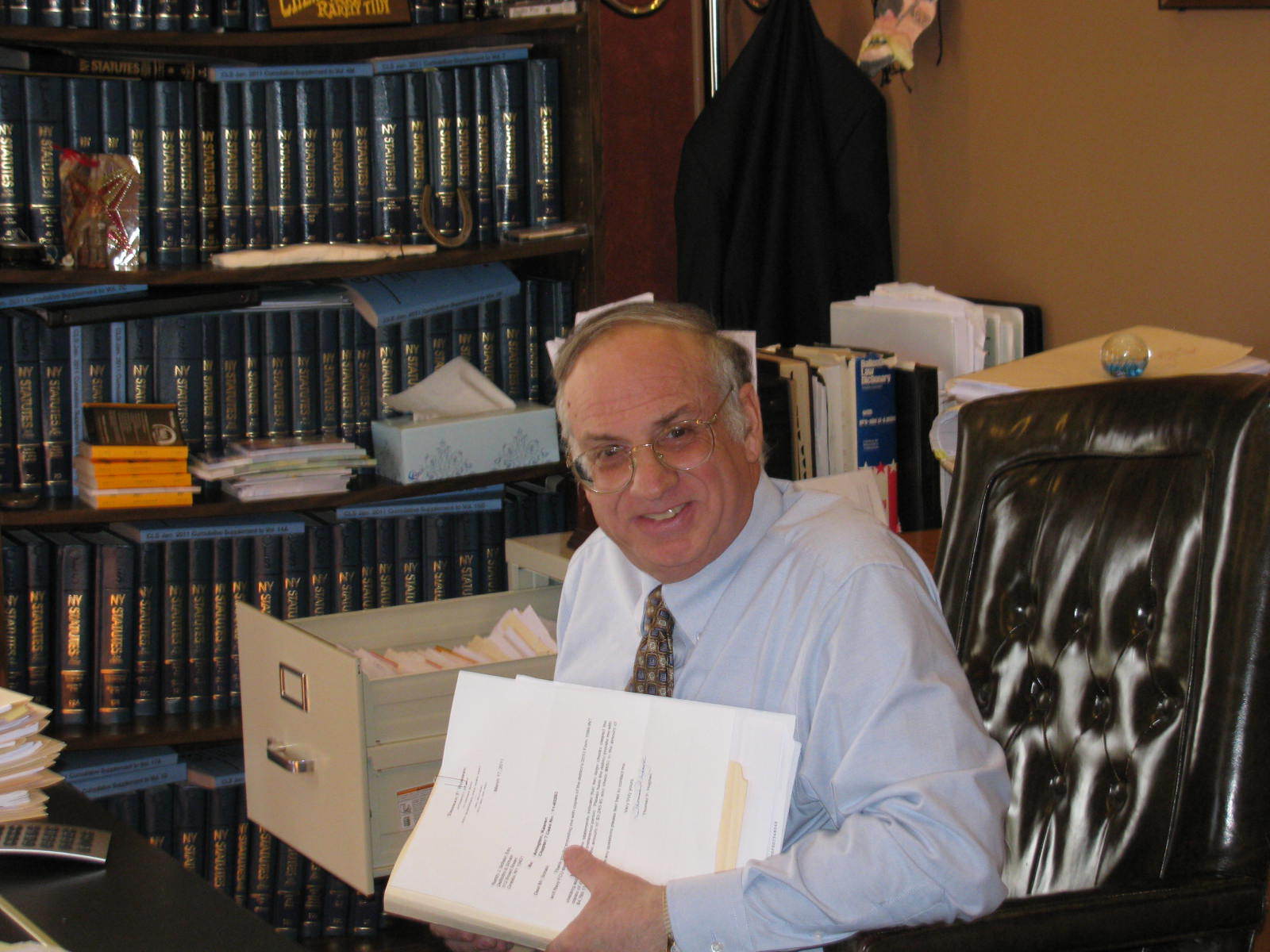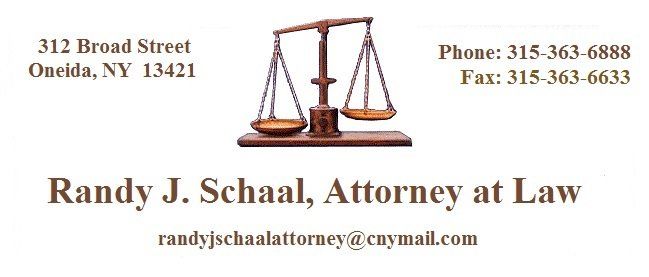Call us: 555-555-5555
Bankruptcy Law
General Bankruptcy Information
Randy J. Schaal, Attorney at Law, Serving Central New York, including Oneida, Rome, Utica, Syracuse, Chittenango, New Hartford, Whitesboro, Bridgeport, Lowville, Boonville and surrounding areas
Call UsIf you want to get a fresh start, stop foreclosures, stop harassing phone calls and protect your assets;
please call for a FREE BANKRUPTCY CONSULTATION.
We are a debt relief agency.
We help people file for bankruptcy relief under the Bankruptcy Code.
Call for your free consultation
today.
Also available in Utica
by appointment only.
Randy J. Schaal
serves as a Chapter 7 Panel Trustee for the Northern District of New York.
If your case has been assigned to Randy J. Schaal, click here for list of documents to send.
There are many different chapters of the Bankruptcy Code.
For answers to some frequently asked questions regarding bankruptcy, click here.
Randy J. Schaal
makes the commitment to stay abreast of changes in the Bankruptcy Code and court decisions which affect his practice.
He spends, on average 13 to 15 hours attending Continuing Legal Education courses, continuing his education in this one practice of law a year. When a major change in the code is in process, such as the 2005 amendments, he had over 100 hours of continuing education courses dealing with those amendments. For instance, he followed the New York State opting-out change in exemptions bill that Govenor Patterson signed on December 22, 2010. There was a 30 day waiting period for the bill to take effect; thus the right to take federal exemptions and the changes in the amounts of the New York State exemptions were effective on January 22, 2011.
Randy also makes the commitment to know his clients and give them personalized service. You will meet with him, not a paralegal or secretary. All initial informational meetings are handled by Randy. Free initial consultations are available, but not on the phone or over the internet. Randy sets aside a half hour of time for a face to face consultation, with no obligation to return.


A Chapter 7 bankruptcy
is a liquidation. However, it is only a liquidation of your non-exempt property. Exempt property are those items that you keep. There are state and federal exemptions. By recent amendment New York State allows you to choose if you want to take state or federal exemptions. In some cases, the New York State exemptions are desirable because of the homestead exemption. If you take the state exemption, it is $89,975 of equity. Equity is the difference between the value of the real property and whatever is owed on the mortgage. Under New York State exemptions you can only take the cash exemption if you do not have a homestead. The New York State cash exemption, if you do not have a home, is $5,000 plus a wild card exemption of $1,000. To file a Chapter 7 you must meet the means test requirements. You do not make any monthly payments in a Chapter 7 bankruptcy except on secured obligations that you want to keep.
Retirement funds are also exempt.
Up to $3,000 in tools of the trade are also exempt.
Personal injury actions are exempt up to the amount of $7,500.
The federal exemptions only have a homestead exemption of $27,900 but there is a Wild Card federal exemption to allow up to $15,425 per person ($1,475 per person plus any unused portion of homestead up to $13,950)., which is an advantage. Thus, whichever you take has to be looked at on a case to case basis.
Both a Chapter 7 and Chapter 13 bankruptcy
ends in a discharge of bankruptcy unless a creditor objects to discharge based on fraud. There are some debts that are not dischargeable; such as most taxes, child support, alimony, most student loans, court fines, court restitution and personal injury caused by drunk driving or under the influence of drugs. A discharge is why you file a bankruptcy because it makes you not liable for those debts. For instance, if your home has no equity and it is being foreclosed on, if the judgment creditor gets a judgment for an amount greater than the value of the house and you file a Chapter 7 bankruptcy; the discharge prevents collection of any deficiency judgment above the value of the house. A Chapter 7 bankruptcy does not prevent a foreclosure, but it does slow it up slightly because the lender has to make a motion in US Bankruptcy Court to lift the automatic stay.
For instance, a home with a mortgage is a secured loan. If you do not make the payments in a Chapter 7 bankruptcy, you cannot keep the real property. However, the Bankruptcy Code gives you certain options.
1. The first option, when property is secured, is to reaffirm; wherein you promise to continue to make the monthly payments and you do so.
2. The second option is to surrender the property, give up the property and not make the payments. For instance, if you had an old car with the lien far in excess of its value and you wish to give up the car; you would stop making the payments and the secured creditor could only move to lift the automatic stay and take the car. They couldn't seek a deficiency judgment against you.
3. The last option for property that is secured is redemption; wherein you can buy it out for its true cash value.
You can only file a Chapter 7 bankruptcy once every eight years. The filing of a Chapter 7 is on your credit history for up to ten years. Having said that, we live in a strange world. Six months after you receive your discharge, which comes out no later than four months after you file, you can get new credit cards and secured car loans. In as little as three years, you will re-qualify for a mortgage.
If you are interested in further information on a Chapter 7 bankruptcy please call 315-363-6888 to make an appointment for a free consultation with Randy J. Schaal.
The means at this time are as follows:
Family of 1 - $68,614
Family of 2 - $84,958
Family of 3 - $103,444
Family of 4 - $126,167
Add $9,000 for each person in excess of 4.
Means income is looked at only by looking at the last six months of income, dividing by six, then multiplying by twelve. Thus, timing of your filing may be important. The means income amounts are routinely updated.
A Chapter 13 bankruptcy
is a way of stopping a foreclosure action, catching up the arrears on the mortgage and keeping your home. Chapter 13 bankruptcy is also sometimes the only option if you do not qualify for a Chapter 7 under the means test.
A Chapter 13 bankruptcy is not the end of the world. It does end with a discharge. However, in a Chapter 13 bankruptcy you are making monthly payments for 60 months. If you are interested in further information on a Chapter 13 bankruptcy please call 315-363-6888 to make an appointment for a free consultation with Randy J. Schaal.
A Chapter 11 bankruptcy
is for a business and a Chapter 12 bankruptcy
is for a farm. If you are looking for information about either please call 315-363-6888
to make an appointment for a free consultation with Randy J. Schaal.
The US Bankruptcy Court has instituted, effective July 1, 2013, a new loss mitigation program to help potentially modify mortgages in Chapter 7, Chapter 13 and Chapter 11 bankruptcies on principal residences only. This is a consensual program meaning that the banks need to consent to any modification.
- This is limited to the debtor's principal residence.
- It needs all parties to be requesting the loss mitigation program. Therefore, if there is a non-filing spouse they would need to be requesting the program as well.
- The real property needs to have homeowner's insurance in place.
- You need to have two years of income tax returns.
- The debtors need to be less than 12 months in arrears on any mortgage payments.
- The debtors must have sufficient income for the monthly post-petition taxes and insurance.
- That a state court has not denied a modification. However, if a state court had denied a prior modification the debtor may show a change in circumstances.
- There must be clear title to the property.
This program is not for everyone as besides the program being consensual and having the above listed elements, there is a court ordered additional attorney's fee for the debtors in the amount of $1,000 to $1,500.
Attorney advertising prior results does not guarantee a similar outcome.
Call Us
Click here to find our Oneida Office
Click here to find our Utica Office
New Title
© 2021 Randy J. Schaal, Attorney at Law
All Rights Reserved
Serving Central New York, including Oneida, Rome, Utica, Syracuse, Chittenango,
New Hartford, Whitesboro, Bridgeport, Lowville, Boonville and surrounding areas
New Hartford, Whitesboro, Bridgeport, Lowville, Boonville and surrounding areas
